 ENDOWED PROFESSORSHIP 2012
ENDOWED PROFESSORSHIP 2012"Can it really be called academic research?"
Friedemann Schrenk, the 13th scholar to hold the Johannes Gutenberg Endowed Professorship, often seems to stray from the normal path. The paleoanthropologist demonstrated this ability once again in his final "Out of Africa" lecture. Moving from fossilized teeth through racist thinkers and genetic findings, he ended up by encouraging people to become members of the Friends of Mainz University association.
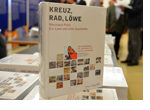 HANDBOOK
HANDBOOKA state with big differences
The first handbook of the history of Rhineland-Palatinate is now available. There has not been a book like this before and the 40 authors who worked on it have charted new territory. Co-publishers Professor Dr. Michael Kißener, Professor for Contemporary History at Johannes Gutenberg-University Mainz (JGU), and Dr. Pia Nordblom, coordinator of the handbook project at JGU, talk about the challenges they faced in the momentous project.
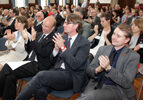 DIES ACADEMICUS 2012
DIES ACADEMICUS 2012Outstanding young researchers and forgotten collections
On its Dies academicus, Johannes Gutenberg University Mainz (JGU) celebrates its young researchers. 14 outstanding dissertations were honored this year. In his ceremonial address, Dr. Andreas Brandtner, Director of the University Library, dealt with a topic that has come back into style after being long ignored: university collections.
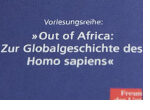 ENDOWED PROFESSORSHIP 2012
ENDOWED PROFESSORSHIP 2012The story of the continent with no history
The cradle of humanity is in Africa, yet the continent is still considered by many to have no history. It is the intention of Professor Dr. Andreas Eckert to change this preconception. Gutenberg Endowed Professor Friedemann Schrenk invited him to rectify this distorted image of Africa in the lecture series "Out of Africa: The Global History of Homo Sapiens."

Immortal minerals
The Mineralogical Collection of the Institute of Geosciences is housed in a simple room with 60s charm. Here, rubies, emeralds, gold, and much more sparkle in plain glass cabinets. Professor Dr. Wolfgang Hofmeister guards these treasures and is responsible for adding new items – sometimes even vaporizing a diamond in the service of science.
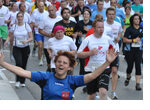 J.P. MORGAN CORPORATE CHALLENGE
J.P. MORGAN CORPORATE CHALLENGEJGU runs in Frankfurt
A team captain, two photographers, 28 runners, and the motto "The Gutenberg Spirit: Moving Minds – Crossing Boundaries" – this is how JGU presented itself at this year's J.P. Morgan Corporate Challenge event in Frankfurt am Main.
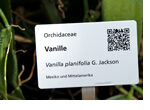 ECONOMIC PLANTS
ECONOMIC PLANTSRenewable resources
The magic word that promises to facilitate energy transition is "renewable resources". They seem like the perfect solution: environmentally neutral, versatile, and constantly replenishing themselves. But are they really a panacea? Dr. Ralf Omlor, custodian of the Botanic Garden at Johannes Gutenberg University Mainz (JGU), is using the occasion of the "Renewable Resources – Plants, Products, Perspectives" Week to put his case that we need to take a more critical approach to this complex aspect.
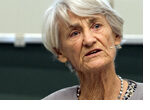 ENDOWED PROFESSORSHIP 2012
ENDOWED PROFESSORSHIP 2012Meave Leakey encounters relatives in Mainz
The famous British paleoanthropologist Meave Leakey came to Mainz at the invitation of Professor Friedemann Schrenk, holder of the 2012 Gutenberg Endowed Professorship. She gave a lecture at Johannes Gutenberg University Mainz (JGU) in which she reviewed six million years of human history. But before that, she met with her ancestors in the Mainz Museum of Natural History.
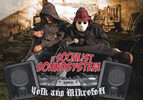 MUSICOLOGY
MUSICOLOGYRight-wing extremism breaks into new music genres
The 'white power' rock bands that emerged in the 1980s are now a thing of the past. Neo-Nazi-inspired strains are moving on to conquer whole new swathes of different styles of music. And this is a development that Dr. Thorsten Hindrichs of the Institute of Musicology at Johannes Gutenberg University Mainz (JGU) finds extremely worrying. In his view, a broad-based collective approach is necessary to counteract this trend.
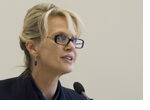 GERMAN ASSOCIATION FOR AMERICAN STUDIES
GERMAN ASSOCIATION FOR AMERICAN STUDIESSiri Hustvedt deplores categorization
She read from her books and tirelessly discussed and debated with experts from various disciplines. The famous US-American author Siri Hustvedt was the star guest of the 59th annual conference of the German Association for American Studies at Johannes Gutenberg University Mainz (JGU). However, she was not the only one with something to say to the more than 300 guests from around the world. Seventy-six speakers gave presentations on the conference theme "American Lives."
